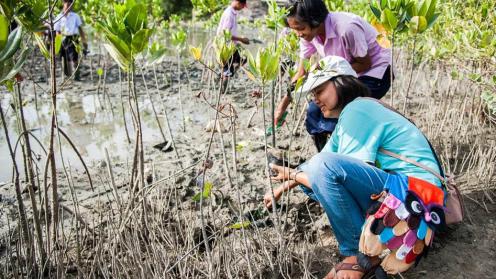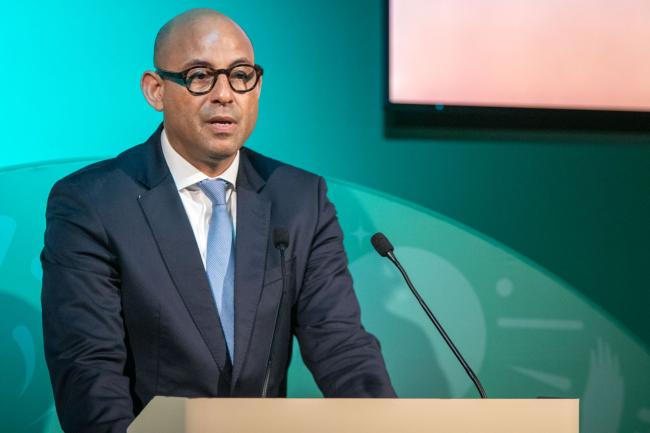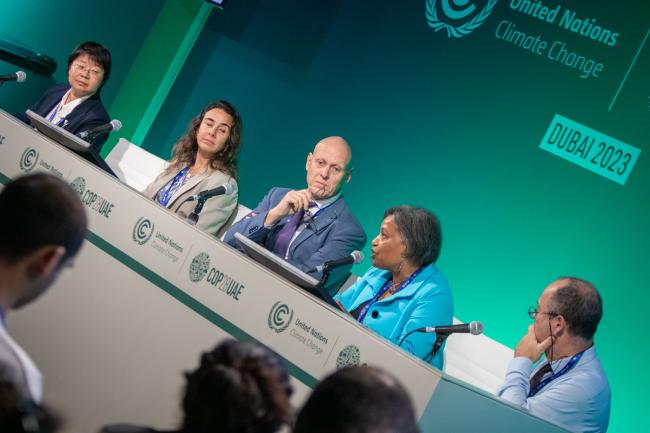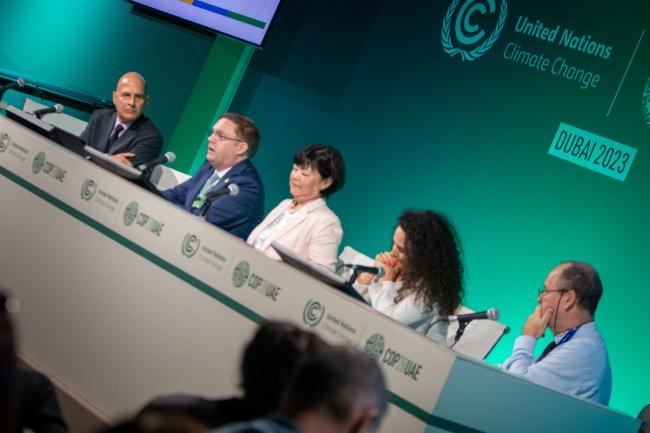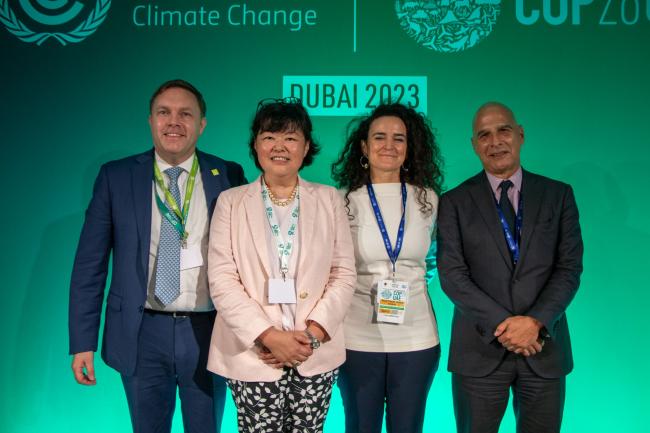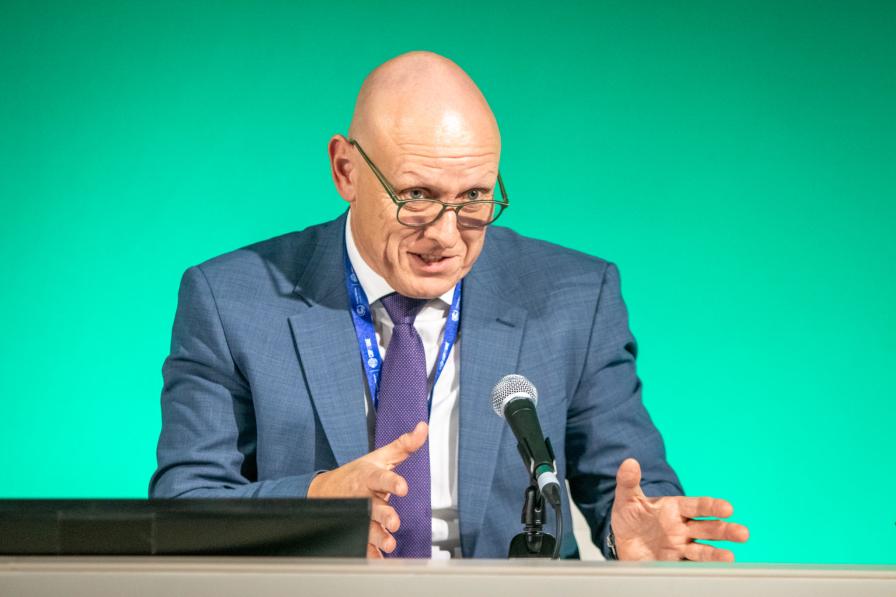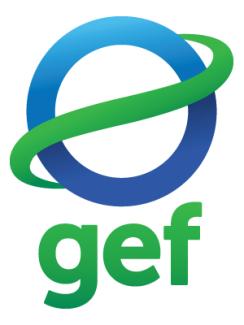About
The four major climate funds jointly announced their commitment to enhance access to and increase the collective impact of climate finance. At this event, high-level leaders discussed the drive to achieve coherence and complementarity in crucial climate finance processes.
Climate finance must be increased to meet the global climate challenge so that developing countries can increase the ambition of their responses. This event highlighted a new joint declaration from the four multilateral climate funds—the Adaptation Fund (AF), the Climate Investment Funds (CIF), the Global Environment Facility (GEF), and the Green Climate Fund (GCF)—that emphasizes their commitment to develop an ambitious and concrete action plan to enhance access to climate finance and increase the collective impact of their actions.
Stephanie Speck, GCF, opened the event by emphasizing the importance of the three Cs that have been emphasized at COP 28— investing in capital, cooperation, and collaboration—and added two more, complementarity and coherence, to unite the priorities of developing countries to power a surge in climate action. She explained that the joint declaration seeks to simplify and enhance access to climate finance through joint programming and country-led investment planning, while also increasing its impacts through collaboration, mobilizing private sector finance, and increasing funding for climate adaptation.
Simon Stiell, Executive Secretary, UNFCCC, provided opening remarks, underscoring the positive steps achieved during the opening days of COP 28, including the establishment of the loss and damage fund with USD 700 million pledged, alongside additional pledges to the GCF totaling USD 12.5 billion. He noted, however, the challenges facing the AF and that “the international financial system is not working for large parts of the developing world” due to perceived or real risks that make the cost of capital too high in developing countries to invest at the scale and speed needed. He urged ensuring the availability and accessibility of climate finance for developing countries and for a collective commitment to make climate funds “pillars of hope and agents of transformative change” supporting developing countries and Small Island Developing States. He stressed that, while the climate funds are making good strides, they remain severely underfunded, preventing them from generating sufficient impact to address the scale of the crisis we face.
Simon Zadek, Executive Director, NatureFinance, moderated two panel discussions, the first of which facilitated a dialogue among leaders and high-level representatives to share their vision on how to increase climate finance to deliver even greater impact, and their view on the role of multilateral funds in supporting the climate ambitions of developing countries.
Tatiana Rosito, Ministry of Finance, Brazil, spoke of the need to internationalize climate finance funds by streamlining access, evaluating existing vertical funds, and identifying optimal ways to deploy resources globally through new financial instruments and the mobilization of additional funds. She noted that the development of comprehensive action plans is needed to ensure effective implementation, as well as multilateral collaboration, such as through the G20 Presidency, to deepen collaboration between countries. To meet this priority, she highlighted the importance of establishing a sovereign sustainable finance working group, as well as the need for concrete solutions to scale up nature-based solutions through blended financial instruments that allow for the mobilization of additional funding.
Alexia Latortue, Department of the Treasury, US, noted that the four funds are “absolutely essential” for countries that: lack the domestic resources to invest in climate mitigation, adaptation, and resilience; are not attractive destinations for foreign direct investment; and face debt vulnerabilities. She emphasized the need to leverage a diversity of funds to multiply efforts, in addition to mobilizing private sector financing.
Zhang Bei, People’s Bank of China, spoke to the role of her bank in advancing green finance through five pillars: developing a green taxonomy; using information disclosure strategies; promoting financial markets; designing effective policy measures; and facilitating cooperation in green finance. Together, these pillars reveal the important role central banks can play in supporting climate finance and high quality, sustainable development.
Dirk Meyer, Ministry for Economic Cooperation and Development, Germany, highlighted the need for continued engagement with traditional contributors, but also the need to increase the cache of the climate funds to attract new financing. He pointed to the need for administrative and creative pressure to break down silos, develop more complementary approaches to financing through innovative instruments and joint programming, and the importance of building and maintaining momentum.
In the second panel, leaders of the four funds emphasized their support for the Joint Declaration, saying that simplifying of access to climate funds and harmonization of these funds are important components of stepping up ambitions.
Kicking off this segment, Mafalda Duarte, Executive Director, GCF, noted that the twin issues of complementarity and coherence have been discussed for some time, but the Joint Declaration represents a commitment to these goals. She urged looking critically at the processes in place to ensure they are capable of delivering on ongoing projects. Duarte also stressed the need for joint programming at the country level and working with these countries to be enablers of support.
Chizuru Aoki, GEF, also underscored the importance of joint investment planning at the country level, and questioned whether there are presently adequate resources for outreach in all recipient countries. Aoki noted many differences in policies and procedures across governments and that a “collective vision of where the funds should be placing ourselves in the landscape” is needed.
Mikko Ollikainen, Head, AF, noted the fund’s progress in harmonizing and aligning processes, such as through the creation of a fast-tracked accreditation process. He said the fund has a structured framework for scaling up projects that works in parallel with the GCF. He acknowledged that adaptation finance can be particularly challenging due to the difficulty of developing business models, but he stressed that much more needs to be done on a grant basis.
Luis Tineo, acting CEO, CIF, underscored that each fund has its own strength, and that one of the CIF’s strengths is its capacity to mobilize the private sector. He noted that the CIF is in a good position to build up to the next level of ambition, as it has recently undergone a reform process, including the streamlining of processes.
Organizer: GEF / An event jointly organized by the four funds
Contact Person: Laura MacInnis lmacinnis@thegef.org or Robert Bisset rbisset@thegef.org
More Info: www.thegef.org
To receive free coverage of global environmental events delivered to your inbox, subscribe to the ENB Update newsletter.
All ENB photos are free to use with attribution. For this COP 28 side event, please use: Photo by IISD/ENB | Matthew TenBruggencate.
Select Images

Alexia Latortue, Assistant Secretary for International Trade and Development, Department of the Treasury, US
